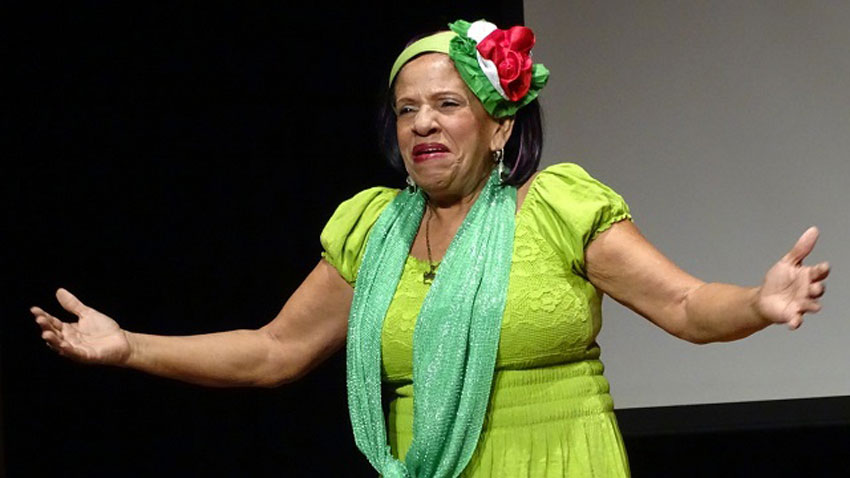
The actress is revealed as an expressive and sensitive oral narrator. She is Veronica Hinojosa. Her contagious smile reminds us of Guillén, Bola de Nieve or the Watercolorist of the Antillean Poetry (Luis Carbonell)… A woman made of sugar and fire, Cuban to the core.
Las Tunas, Cuba.- About a month ago, she returned from a cultural exchange tour in Costa Rica. The people there want her to come back. She earned her affection with work and that innate charisma that characterizes her. That's why 26Digital approaches her experience in that nation.
“I first went there in March and came back in April 2019. At that time, I participated in the Word of Women Festival, a very interesting event that they do every year to defend the rights and equality of women. There, the municipality of Cartago declared me an Illustrious Visitor. I was representing Los Zahoríes puppet theater de Las Tunas and Cuba, in general. And I remained as a member of a project that was inaugurated with me called Leect, a symbiosis between the words read and culture, which promotes in all ages the love for books and art. I am told that I am the godmother of that initiative, directed by Dr. Olga Solano and the Technological Center of Science and Language of Cartago."
Her performance in that country allowed her to return quickly. “After six months, I had to return. I worked in all the houses of higher learning, including the Central American and Caribbean University, which is in the province of Limón. I gave workshops in puppetry manipulation or animation to students in that and other centers, as there were many requests.
“I also taught a group of older people oral narration and written literature, because the two subjects must go together. You have to do a play to be able to reach the story and guarantee that it will be told to an audience, since not everyone has that characteristic. It was wonderful. I remember a 90-year-old woman who wrote 28 stories. It is gratifying how I influenced them, they even told me: 'We were at home doing nothing and now we find a reason to go on living."
“Then another project was opened for children, starting with the 3-year-olds up to the high school students. Apart from being a teacher, I acted for them using puppets and storytelling. The play A Time for Love, for example, which I performed at the Storytelling House in Cartago, was very popular."
She shows me multiple recognitions earned with effort in that land and takes a moment to talk about some differences in artistic teaching here and there. “In Cuba, besides the University of the Arts (ISA by its Spanish acronyms), from which I graduated, there are vocational and professional schools, but in that nation, they do not exist. Only in the universities and in the schools (from seventh grade onwards) is art one more subject and each one chooses a manifestation."
She, who has represented Cuba in various competitions in countries such as Mexico, Venezuela and Colombia, does not cease to offer her heart and talent in favor of cultural development. “I have worked hard to raise the name of my province and my country, giving away everything all that I know about storytelling and these 48 years that I have been in the puppet theater, although I have also worked for adults. I have proven that art shapes people, he adds.
“In addition, I participated in an International Congress of English Teachers with the show “From a long green lizard”, and I demonstrated that you can count on a translator by your side. There were attendees from the United States, France, England, the Caribbean and elsewhere. It was a beautiful experience."
“Subsequently, I presented “History of the Letter H”, a play of my authorship that narrators from various countries have in their repertoire and emphasizes the importance of good spelling. With this story, I made myself known and then the invitations began, among them the possibility of giving puppet animation workshops to teachers from first to sixth grades. I talked to them about their story, classifications and other elements.
And they began to give their classes with puppets of this type, because it has been shown that children pay more attention to form than content and thus capture knowledge better."
As a member of the Nicolás Guillén Foundation, she was concerned with disseminating the work of the Cuban National Poet there. “I exchanged knowledge with the Mestizo Project, directed by Beto Campo and its managers were so impressed that they invited me to go in September of this year if the new coronavirus pandemic allows it. That way, I would work with that initiative and with Leect.
I feel satisfied because I have trained several people and one of the most perfect creations is my daughter Leonor, who follows the legacy in Los Zahoríes, who stands out among her laurels with the National Community Culture Award and the Creation Award for Lifetime Achievement.





